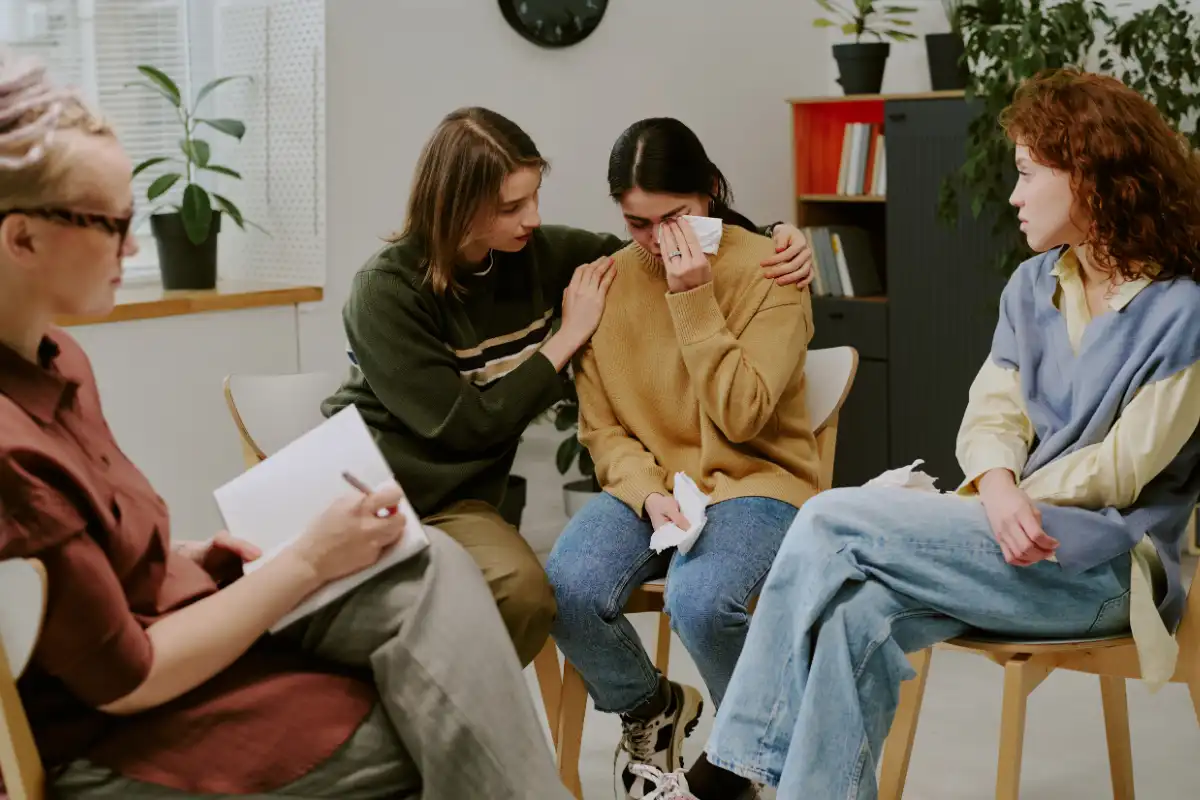
Addiction doesn’t just affect one person — it affects everyone who loves them. When a person struggles with drug or alcohol addiction, their family often carries the weight of the chaos, fear, confusion, and heartbreak that come with it. Parents lose sleep wondering if their child is safe. Spouses struggle to rebuild trust. Children grow up in unstable homes. Siblings feel helpless watching someone they care about self-destruct.
But here’s the hopeful truth: healing can happen for everyone, not just the person in treatment. Addiction recovery isn’t a solo journey — it’s a family journey. At 10 Acre Ranch, we’ve seen the transformative power that family involvement brings to the recovery process. When families heal together, they rebuild relationships, restore trust, and create a stronger foundation for lifelong sobriety.
This article explores why recovering as a family matters, how addiction impacts family systems, and the ways families can actively participate in their loved one’s recovery journey.
Addiction Is a Family Disease
Addiction is often described as a family disease because it affects every member of the household — emotionally, mentally, and sometimes physically or financially. While only one person might be using drugs or alcohol, everyone around them feels the effects.
Each family member takes on a role to cope with the dysfunction that addiction creates:
- The Enabler tries to minimize the consequences of addiction, often covering up or rescuing the addicted person from accountability.
- The Hero overachieves to bring order or pride back to the family’s reputation.
- The Scapegoat acts out or rebels to draw attention away from the addiction.
- The Lost Child withdraws emotionally and avoids conflict.
- The Mascot uses humor or charm to diffuse tension.
While these roles may provide short-term emotional survival, they prevent the family from addressing the underlying pain. In recovery, the goal isn’t to assign blame but to understand how each person’s coping mechanisms developed — and how they can now shift toward healthier patterns.
At 10 Acre Ranch, we help families recognize these roles so they can break out of destructive dynamics and begin healing as a team.
Why Family Involvement Is Critical in Recovery
Many people entering treatment believe recovery is an individual process — something they must do alone. But addiction isolates people, and isolation is the enemy of recovery. True healing happens in connection — with peers, counselors, and most importantly, with family.
When families engage in the recovery process, several powerful things happen:
1. Healing Broken Trust
Addiction often leads to lies, secrecy, and betrayal. Loved ones may have been hurt, manipulated, or disappointed time and again. Participating in family therapy creates a safe space for honest conversations, where each person can express pain, rebuild trust, and learn forgiveness over time.
2. Creating a Supportive Home Environment
When a person leaves treatment and returns to an environment that hasn’t changed, relapse becomes much more likely. Family therapy helps everyone learn new communication skills, boundaries, and routines that support sobriety at home.
3. Understanding Addiction as a Disease
Many families misunderstand addiction as a moral failure or lack of willpower. Education is key — learning about how addiction affects the brain helps family members respond with compassion rather than judgment.

4. Preventing Codependency and Enabling
Family members often want to help but unintentionally make things worse by enabling unhealthy behaviors. Through family counseling, they learn how to provide support without rescuing or controlling.
5. Promoting Accountability
When the family understands recovery, they can encourage accountability in a healthy, loving way — reminding their loved one of their goals, boundaries, and the importance of staying on track.
Family involvement doesn’t just help the individual — it heals the entire system. Everyone deserves recovery.
The Emotional Toll on Families
Families of addicted individuals experience their own form of trauma. The constant fear of relapse, the financial strain, and the unpredictable behavior of a loved one can cause chronic stress, anxiety, and depression. Over time, family members may feel burnt out, hopeless, or resentful.
In some cases, spouses or parents may even develop codependency — a pattern of behavior where they lose sight of their own needs while trying to “save” the addicted person.
At 10 Acre Ranch, we often remind families: You didn’t cause the addiction, you can’t control it, and you can’t cure it. What you can do is heal your own emotional wounds and learn healthier ways to relate to your loved one.
Healing the family system means everyone gets the support they need — not just the person in rehab.
Need Help? Let’s Talk!
Your path to recovery begins with a simple conversation.
Call now to speak confidentially with an admission counselor.
What Family Recovery Looks Like
Recovering as a family is not about perfection or quick fixes. It’s about progress, patience, and commitment to healing. Each family’s journey looks different, but there are some universal components that can make the process more effective.

1. Family Therapy Sessions
Most quality treatment centers, including 10 Acre Ranch, integrate family therapy into their programs. These sessions are led by licensed therapists who help family members communicate honestly, resolve conflicts, and build empathy.
Therapists guide discussions that address issues such as:
- Unhealed resentment or anger
- Miscommunication patterns
- Trust rebuilding
- Emotional boundaries
- Expectations after treatment
These sessions help replace blame and frustration with understanding and teamwork.
2. Educational Workshops
Knowledge is power. Family education groups teach loved ones about addiction science, relapse triggers, and recovery tools. The more a family understands the disease, the more effectively they can support recovery.
3. Support Groups for Families
Groups like Al-Anon, Nar-Anon, and Families Anonymous provide a supportive environment for people who love someone with an addiction. These meetings remind family members that they’re not alone and help them focus on their own healing.
4. Setting Healthy Boundaries
One of the most empowering things a family can learn is how to set boundaries. Boundaries protect both the recovering person and their loved ones. They define what behaviors are acceptable, what consequences follow, and how to maintain mutual respect.
For example, a boundary might be:
- “We will support your recovery, but we can’t support active substance use.”
- “You can live at home as long as you attend meetings and therapy.”
Boundaries help create structure, accountability, and safety — all essential to long-term recovery.
5. Rebuilding Connection and Trust
Healing relationships takes time. Trust is rebuilt through consistent honesty, follow-through, and patience. Families can rebuild closeness through shared activities, open communication, and quality time together free from substances and conflict.
The Benefits of Family Healing
When families heal together, the benefits ripple through every aspect of life — emotional, psychological, and even physical.
Here are some of the positive outcomes we see at 10 Acre Ranch when families engage in recovery together:
- Improved Communication: Families learn how to express feelings without blame or anger.
- Reduced Relapse Risk: A supportive home environment drastically lowers the chances of relapse.
- Emotional Stability: Both the recovering individual and family members experience less anxiety, guilt, and fear.
- Stronger Relationships: Families reconnect on a deeper level, learning to trust and love without enabling.
- Better Problem Solving: Instead of reacting emotionally, families learn to approach challenges collaboratively.
- Generational Healing: When one family heals, it breaks cycles of dysfunction that could affect future generations.
The power of family recovery lies in unity. Healing together creates resilience that lasts far beyond the treatment program.
Common Challenges Families Face in Recovery
While family recovery is deeply rewarding, it’s not always easy. Every family has its own history, wounds, and habits that may surface during the process.
Here are some common obstacles and how to overcome them:
1. Unrealistic Expectations
Recovery is not linear. Families sometimes expect instant change, but healing takes time. Relapse, emotional setbacks, or communication breakdowns can happen. The key is to stay committed to progress, not perfection.
2. Blame and Resentment
It’s natural for family members to feel anger or resentment toward the addicted person. Therapy provides a space to process those feelings safely so they don’t fester or damage relationships.
3. Fear of Relapse
Many families live in constant fear of their loved one relapsing. Education and open communication can help replace fear with preparedness and trust.

4. Difficulty Letting Go of Control
Family members often want to “fix” their loved one. But recovery is an individual journey. Learning to offer support without control is one of the most powerful lessons in family healing.
At 10 Acre Ranch, we walk families through each of these challenges, teaching practical tools for emotional regulation, communication, and ongoing support.
The Role of Family After Treatment
The end of residential treatment is not the end of recovery — it’s the beginning of a new chapter. Families play a crucial role in maintaining long-term sobriety.
Here’s how to continue supporting your loved one after treatment:
- Encourage Continued Care: Help your loved one stay engaged in therapy, 12-step meetings, or aftercare programs.
- Celebrate Progress: Recognize milestones like 30 days, 6 months, or 1 year sober. Positive reinforcement builds motivation.
- Maintain Healthy Routines: Structure, stability, and consistency at home create a safe foundation for recovery.
- Communicate Openly: Keep discussions honest but compassionate. Check in regularly about how each person is doing emotionally.
- Prioritize Self-Care: Supporting someone in recovery can be emotionally draining. Make sure you’re caring for your own mental health too.
Remember: recovery is not about control — it’s about connection. Your love and presence matter more than perfection.
How 10 Acre Ranch Supports Family Recovery
At 10 Acre Ranch, we know that addiction affects the entire family system, and we treat it that way. Our programs are designed to heal not just the individual, but the family as a whole.

We offer:
- Comprehensive Family Therapy: Guided sessions that focus on communication, healing, and understanding.
- Education & Resources: Workshops that teach families about addiction science, relapse prevention, and emotional health.
- Aftercare Planning: Support for families as their loved one transitions back into daily life.
- Community Connection: Access to family support groups and alumni programs that foster ongoing recovery.
Our compassionate team helps families find hope, rebuild trust, and learn how to thrive together in sobriety.
Recovering as a Family: A Shared Victory
When a loved one enters addiction treatment, it can feel like the end of the world. But with the right support, it can become the beginning of something new — a chance for everyone to grow, heal, and rediscover what it means to love unconditionally.
Recovering as a family is about turning pain into purpose. It’s about learning new ways to communicate, reconnect, and rebuild trust. Most importantly, it’s about realizing that no one has to face addiction — or recovery — alone.
At 10 Acre Ranch, we’ve seen families who once felt broken rediscover unity, joy, and strength. When you heal together, recovery becomes more than sobriety — it becomes a shared victory.
10 Acre Ranch — Helping individuals and families heal from addiction together. Because recovery is stronger when you do it as a family.






